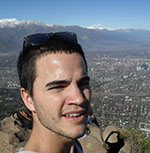By Jeremy Stevenson, VE Volunteer, May 2013
Living in a foreign country and volunteering with children is not an experience that is completely new to me. Four years ago I lived in Bolivia for a short stint during which I learnt Spanish and volunteered at a children’s home; it was an amazing experience. However, while there are some similarities in the nature of my Chilean experience, there are also some crucial differences.
The first is in relation to the ‘Spanish’ that is spoken here in Chile. Whereas Bolivian Spanish is a haven for new learners, being slow and clear, Chilean Spanish is spoken at light speed and is riddled with slang; an amount of slang that I have only seen in my home country of Australia. The little ego I developed while travelling South America previously was quickly popped on arrival in Chile. I found myself listening to long sentences from locals and understanding one or two words (like ‘the’ and ‘what’). However, there is no debating that Chilean Spanish has a distinct flavour and a certain charm to it. Some people also say that, if you are able to learn Chilean Spanish, you will understand Spanish anywhere in the world. So while I sometimes feel a little uncool speaking here, it will definitely be cool (bacán) when I can converse on a more solid level – and in the one month I have spent in Chile, I have already noticed my collection of Chilean slang, or chilenismos, increasing (poh).
The second difference is in relation to the children’s home in which I am volunteering here in Chile. I am volunteering at a home called Hogar Posada del Niño, a residential home for boys between the ages of 5 and 18, who have been placed there by the Chilean family court system. In comparison to the relatively relaxed environment in which I volunteered in Bolivia, this home is a more challenging environment. Perhaps the greater amount of testosterone results in the boys being more physical and less inclined to be obedient and respectful. My first day in the Hogar was quite predictive of my first 3 weeks. There were moments when I thought to myself, “this is going to be too much”, but these challenging moments were balanced with other nourishing experiences, like conversing with boys gripped with curiosity about my home country and the plentiful dangerous animals that dwell there. Since then I have had water sprayed on me, been shouted at to “go away”, and had boys not listen to basic requests. However, I have also had boys eager to help my Spanish, beg me not to leave, and ask me to pick them up until I could no longer move my arms.
So, while there have been numerous difficult moments, and there will continue to be more, there have also been very positive experiences. Moreover, my modest life experience thus far has shown me that personal growth often requires some level of discomfort. I also feel as if the two weeks of training provided by VE prepared me well for this experience, particularly the time spent with previous volunteers. With the reality that the next 3 months will fly past, I embrace the new challenges that lie ahead of me.



